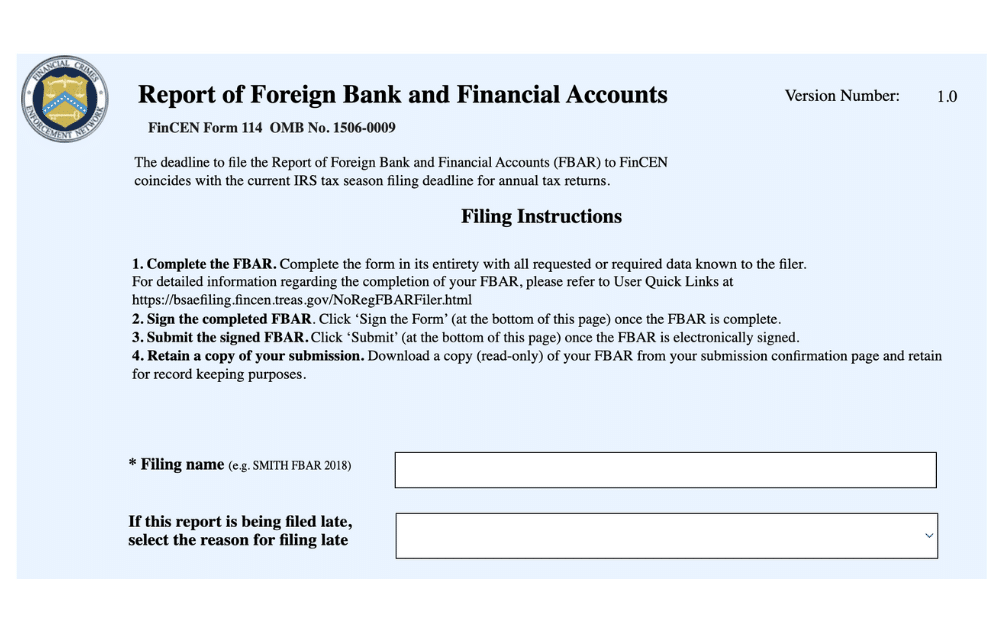What Expats Need to Know About 2025 Tax Deadlines

- When Does the 2024 US Tax Season Start?
- Timeline of 2025 Tax Deadlines
- Expat-Specific Requirements and Deadlines
- What Tax Forms Do Expats Most Commonly Use?
- What If I Miss My Filing Deadline?
- Who Needs to Make Estimated Quarterly Payments?
- Business Tax Deadlines 2025
- Tips for Staying Organized and Filing On Time
- Frequently Asked Questions
- If You Have Questions Regarding Tax Deadlines, We Have Answers!
Moving abroad can be the adventure of a lifetime, but even though you’re leaving the country, you’re still responsible for US taxes.
The 2025 tax deadline is the same for all Americans – Tuesday, April 15. However, expats have unique filing requirements and special deadlines to be aware of. It’s important to prepare to file on time. It will bring you peace of mind and help you avoid an unpleasant late filing penalty.
In this article, we’ll cover unique expat filing requirements that may be new to you, the 2025 deadlines you need to know, and handy tips that will save you time and money come tax season.
Let’s dive in.
Key Takeaways
- The regular tax deadline for expats is April 15. If you’re outside of the US and Puerto Rico on that day, there is an automatic two-month filing extension. Note this extension is only for filing taxes. There is no extension beyond April 15 for paying taxes. Interest accrues for late tax payments made after the April 15.
- Expats with significant funds in foreign bank accounts must file an FBAR by April 15. This requirement comes with an automatic six-month extension.
- Everyone can file a normal extension before their deadline, which allows them to file their tax return penalty free by October 15.
- Living abroad means some taxpayers are taxed twice. However, properly navigating totalization agreements, the Foreign Earned Income Exclusion, and Foreign Tax Credit can relieve you of this burden.
- Our specialty is helping expats file taxes. Many of our CPAs are expats themselves, so we understand your unique challenges. If you file through us, you’ll know your expat taxes were done right. Contact a Greenback Expat Tax Services customer champion today.
When Does the 2024 US Tax Season Start?
The US tax year is the same as the calendar year—January 1 to December 31. “Tax season” is when the IRS begins accepting income tax returns. The Internal Revenue Service will start to accept returns for the 2024 tax year on January 27, 2025.

Are You Ready to Move Abroad?
Choose the answer to each question that best describes you or your current situation, and learn how ready you are to start a life abroad.
Are You Ready to Move Abroad?
"*" indicates required fields

You have an adventurous spirit but you may need to prepare a bit more to ensure a smooth transition abroad. Consider researching more about the cultural, legal, and financial aspects of living overseas.
You’re on the right track. You’ve started to think about what life abroad will entail. Keep building on your preparations to avoid any surprises once you’ve moved.
You’re ready to move abroad! You seem well-prepared and have done your homework! You’re ready to embrace the expat life with confidence.
Timeline of 2025 Tax Deadlines
| Q4 2024 estimated tax due | January 15 |
| IRS begins accepting 2024 tax returns | January 27 |
| Due date for employers to send W2s | January 31 |
| Regular 2024 filing deadline (expats get an automatic two month extension) | April 15 |
| S corp, partnership, and multimember LLC filing deadline | March 15 |
| Expats with significant foreign assets file FATCA | April 15 |
| Deadline to request a regular 6-month filing extension | April 15 |
| Last day to make IRA and HSA contributions for 2024 tax year | April 15 |
| Q1 2025 estimated tax due | April 15 |
| Regular filing deadline if you filed a 6-month extension | March 17 |
| Automatic expat filing extension deadline | June 16 |
| Q2 2025 estimated tax due | June 16 |
| Q3 2025 estimated tax due | September 15 |
| Regular filing deadline if you filed a 6 month extension | October 15 |
| Automatic FBAR extension deadline | October 15 |
| Q4 2025 estimated tax due | January 15, 2026 |
Expat-Specific Requirements and Deadlines
In addition to standard income tax filing, expats are potentially required to file either of the following:
- FBAR: If you have over $10,000 held in foreign bank accounts at any time during the year, you must report this by filing a FinCEN Form 114 with the Department of Treasury. The deadline to do so is April 15, but if you miss this, there’s an automatic-no-application-necessary extension that lasts until October 15. FBAR penalties can be severe, with the lowest potential penalty beginning at $12,500 annually.
- FATCA: If you own non-US financial assets valued above certain thresholds, you must file a Form 8938 FATCA report with your annual income tax return. The threshold depends on your filing status and if you’re a bona fide resident of a foreign country, but the lowest possible amount is $50,000.
What Tax Forms Do Expats Most Commonly Use?
- Form 1040: The standard individual tax return that all Americans use to report income. Depending on your situation, you may have to attach Schedules 1, 2, and/or 3.
- Form 2555: Used to claim the Foreign Earned Income Exclusion, which allows you to exclude a certain amount of income from US taxation.
- Form 1116: The Foreign Tax Credit form, which provides a dollar-for-dollar reduction on US taxes against those paid to a foreign government.
- Form 8938 (FATCA): Used to report foreign financial assets.
- FinCEN Form 114 (FBAR): For reporting foreign financial accounts exceeding $10,000.
- Form 5471: Used to report ownership in foreign corporations.
- Form 8621: Required for shareholders in Passive Foreign Investment Companies.
- Form 3520: Used to report transactions with foreign trusts, ownership of foreign trusts, some foreign retirement and pension accounts, and receipts of certain gifts from foreign persons.
What If I Miss My Filing Deadline?
Filing or paying late can result in penalties. However, if you’ve already missed the deadline, don’t panic; you probably have options.
While the standard deadline for US citizens to file a Federal Tax Return is April 15, 2025, this deadline is automatically extended for those outside the US and Puerto Rico to June 16. You don’t have to apply for this extension. Instead, when you do file, tell the IRS you were out of the country on the regular due date.
If you need more time to file, you can request an additional filing extension to October 15 by submitting Form 4868. Once submitted, the IRS will normally approve you. Under extreme circumstances, you can request an extension to December 15 by mailing a written request to the IRS.
The IRS allows for extensions to the filing deadline, but still charges penalties for paying after the normal due date. The rate is 5% of the tax owed, per month, up to a cap of 25%.
As an expat, you may qualify for the Streamlined Filing Compliance Procedures. This is an amnesty program for expats who were unaware they had to file, and if you qualify, the IRS will likely waive any penalties you would otherwise be subject to.
If you’re behind on your US taxes, you may qualify for a special compliance program to get back on track without penalties. Download our Streamlined Filing Eligibility guide to understand if you qualify.

Who Needs to Make Estimated Quarterly Payments?
If you expect to owe over $1,000 when your tax return is prepared, making estimated quarterly payments is a good idea. Not only can you avoid a huge bill when you prepare your April return, but if you owe too much at the end of the year, you may face late payment interest fees from the IRS. The most common types of taxpayers who make estimated payments are:
- Self-employed people
- Those with significant investment or retirement income
- Beneficiaries of large windfalls, such as the sale of a major asset or inheritance
- Alimony recipients
- Taxpayers who receive income from partnerships or S Corps
Additionally, expats employed by a foreign business that does not withhold or pay taxes to the US government on their behalf may want to file estimated quarterly payments.
What about the deadlines for these payments? Estimated payments for tax year 2024 are due on:
- April 15, 2025
- June 16, 2025
- September 15, 2025
- January 15, 2026
Business Tax Deadlines 2025
The deadline for filing a business tax return depends on how the business is structured. The deadlines for each structure are as follows:
- S corporation: March 15, 2025
- Partnership: March 15, 2025
- Multi-member LLC: March 15, 2025
- Sole Proprietorship: April 15, 2025
- Single-member LLC: April 15, 2025
- C corporation: April 15, 2025
If you operate on a fiscal year rather than the calendar year, the standard filing deadline is the 15th day of the third month (or fourth month for C corporations) following the close of your fiscal year. If this deadline falls on a weekend or legal holiday, the deadline is moved to the next business day.
You can request an extension if you need more time to file a business tax return. The deadline to do so is when your taxes are normally due.
Tips for Staying Organized and Filing On Time
Filing taxes isn’t fun for anyone, even if your situation is fairly straightforward. But if you can avoid it, don’t make the process any more difficult than it needs to be; stay organized during the year.
Start by having a system for storing all your documents well in advance. Maybe this is a Dropbox folder labeled “taxes 2025” or even a physical folder where you store records of income, bank statements, or business expenses. Either way, whenever you receive an important record, make a habit of organizing and storing it.
Separating your business and personal accounts is good financial practice if you’re self-employed. Your LLC can only shield personal assets from business mishaps if finances are separated. Plus, using separate credit and debit cards makes identifying tax-deductible business expenses easy.
For those with more complex tax situations, consulting with a Greenback tax professional can save time and reduce stress. A professional experienced in expat tax preparation can help navigate nuances like the Foreign Earned Income Exclusion, Foreign Tax Credit, or tricky FATCA filing requirements. They’ll ensure you meet deadlines, avoid costly penalties, and give you peace of mind during tax season.
Frequently Asked Questions
Do Expats File US Taxes Even If They Live Abroad?
Yes. The US uses a worldwide tax system, where people are taxed based on citizenship rather than residency status. However, for those who pay foreign taxes, there are quite a few options available for reducing or eliminating the burden of double taxation.
When Is the Last Day to File Taxes?
This depends. The standard deadline is April 15, but you can request a six-month extension that the IRS will normally auto-approve to June 16. Additionally, expats receive automatic two-month extensions without having to apply.
What Happens if I Miss the June Filing Deadline?
You still have options if you’re an expat and are about to miss the automatic June 16 filing deadline. While there are late filing and payment penalties to consider, the Form 4868 extension can be filed which buys you until October 15 to file. Additionally, the IRS may waive penalties for delinquent tax returns if you qualify for the Streamlined Filing Compliance Procedure.
The key to managing missed deadlines is prompt action. File sooner rather than later to minimize negative consequences.
What Is the Expat Tax Deadline for 2025?
Expat taxes are due April 15 but are eligible for an automatic two-month extension to June 16.
If You Have Questions Regarding Tax Deadlines, We Have Answers!
Understanding 2025 tax deadlines and extensions is critical for American expats who want to stay compliant and avoid penalties. With unique filing requirements like the FBAR and FATCA, proactive planning is important for managing your finances abroad.
Professional help can make navigating these complexities less stressful. At Greenback, we’ve helped over 18,000 expats file over 60,000 returns while maintaining a 4.9-star average on TrustPilot. We’re proud of our high repeat client rates and would be delighted to show you the genuine service mindset we’ve come to be known for. Reach out to an expat tax services expert today.
Contact us, and one of our customer champions will gladly help. If you need precise advice on your specific tax situation, you can also click below to get a consultation with one of our expat tax experts.




